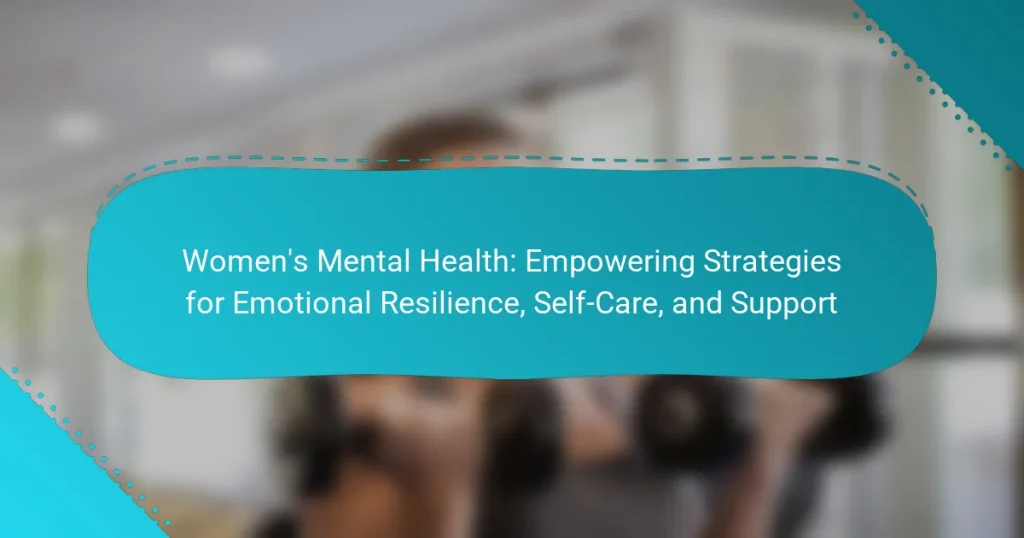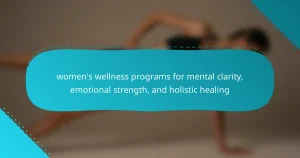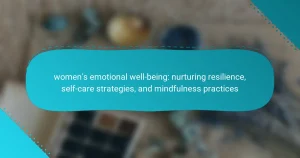Women’s mental health is crucial for emotional resilience and overall well-being. This article explores effective self-care practices, the importance of supportive relationships, and strategies for managing stress. It also addresses common misconceptions and highlights available resources for support. By prioritizing mental health, women can enhance their emotional strength and navigate life’s challenges more effectively.
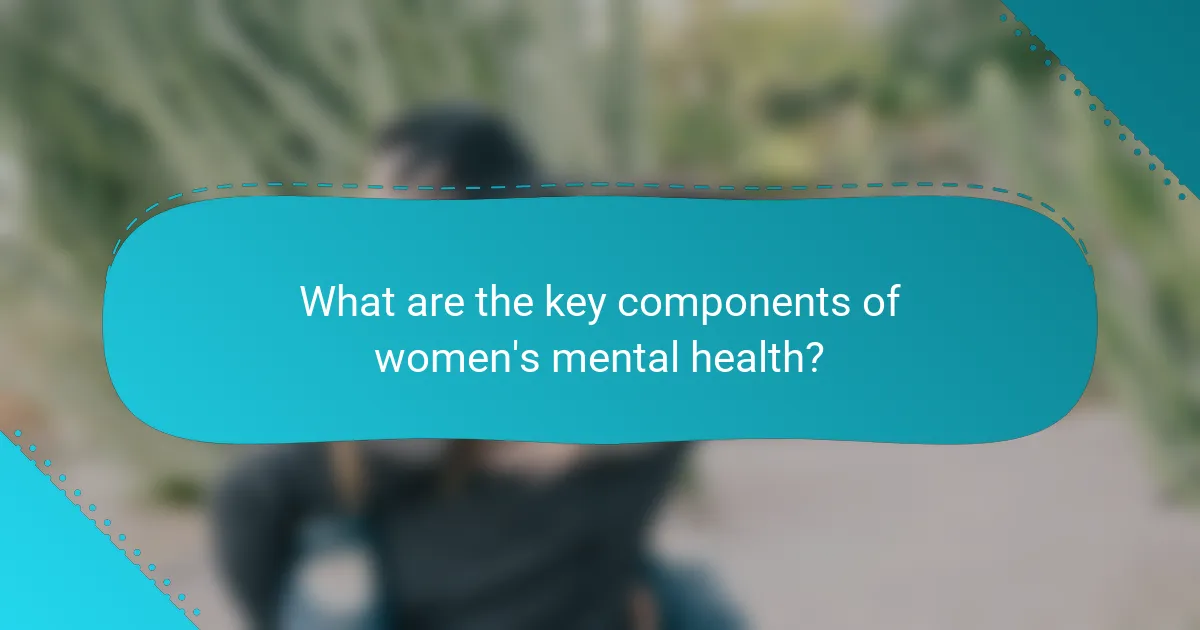
What are the key components of women’s mental health?
Women’s mental health encompasses various key components that promote emotional resilience and well-being. These include self-care practices, access to support systems, and awareness of mental health issues.
Self-care involves activities that enhance physical and emotional health, such as exercise, mindfulness, and healthy eating. Support systems are crucial, providing networks of friends, family, and mental health professionals. Awareness of mental health issues, including anxiety and depression, helps in early identification and intervention.
Empowering strategies that integrate these components foster a holistic approach to women’s mental health, leading to improved emotional resilience.
How do hormonal changes impact emotional well-being?
Hormonal changes significantly affect emotional well-being in women. Fluctuations in hormones like estrogen and progesterone can lead to mood swings, anxiety, and depression. For example, during menstrual cycles or menopause, many women experience heightened emotional sensitivity. These changes can disrupt emotional resilience, making self-care and support crucial. Engaging in mindfulness practices, regular exercise, and seeking social support can mitigate these effects and enhance emotional stability.
What role does social support play in mental wellness?
Social support significantly enhances mental wellness by providing emotional, informational, and practical assistance. Women often experience unique stressors, and strong social networks can mitigate feelings of isolation. Research indicates that supportive relationships contribute to lower anxiety and depression rates among women. Engaging with friends and family fosters resilience, promoting healthier coping strategies and emotional stability.
How can self-care practices enhance emotional resilience?
Self-care practices significantly enhance emotional resilience by promoting self-awareness and reducing stress. Engaging in activities like mindfulness, exercise, and social connections fosters a positive mindset. Studies show that women who prioritize self-care experience improved mental well-being, leading to better coping strategies during challenging times. Incorporating these practices regularly can create a robust support system that empowers women to navigate emotional challenges effectively.

What are effective self-care strategies for women?
Effective self-care strategies for women include mindfulness practices, physical activity, and social support. These approaches enhance emotional resilience and overall well-being.
Mindfulness practices, such as meditation and journaling, reduce stress and promote self-awareness. Engaging in regular physical activity, like walking or yoga, boosts mood and energy levels. Building a strong support network of friends and family provides emotional safety and encouragement.
Incorporating these strategies into daily routines fosters a proactive approach to mental health. Women can prioritize self-care to cultivate resilience and navigate life’s challenges more effectively.
What daily routines promote mental health?
Daily routines that promote mental health include regular physical activity, mindfulness practices, and social connections. Engaging in exercise boosts mood and reduces anxiety. Mindfulness techniques, such as meditation, enhance emotional resilience. Building strong social ties provides essential support and fosters a sense of belonging. Prioritizing self-care, such as adequate sleep and balanced nutrition, further strengthens mental well-being.
How can exercise improve mood and reduce anxiety?
Exercise significantly enhances mood and alleviates anxiety through various mechanisms. Physical activity releases endorphins, which are natural mood lifters. Regular exercise also improves sleep quality, reduces stress hormones, and promotes social interaction, all contributing to better emotional health. Studies show that even moderate exercise can lead to a noticeable reduction in anxiety levels. For women, incorporating exercise into daily routines can empower emotional resilience and foster a sense of control over mental well-being.
What nutritional choices support emotional stability?
A balanced diet rich in omega-3 fatty acids, whole grains, and antioxidants supports emotional stability. Foods like fatty fish, nuts, seeds, and leafy greens enhance brain function and mood. Omega-3s, found in salmon and walnuts, improve neurotransmitter function, while whole grains provide steady energy and reduce mood swings. Antioxidants in fruits and vegetables combat oxidative stress, which can negatively affect mental health. Regular meals and hydration are crucial for maintaining stable blood sugar levels, further supporting emotional resilience.
What relaxation techniques can alleviate stress?
Mindfulness, deep breathing, and progressive muscle relaxation are effective techniques to alleviate stress. These methods enhance emotional resilience and promote self-care in women’s mental health.
Mindfulness involves focusing on the present moment, reducing anxiety and improving overall well-being. Deep breathing exercises help lower heart rate and calm the mind, providing immediate relief. Progressive muscle relaxation systematically tenses and relaxes muscle groups, releasing physical tension and fostering relaxation.
Incorporating these techniques into daily routines can significantly enhance emotional support and resilience. Regular practice leads to long-term benefits, making them valuable tools for managing stress.
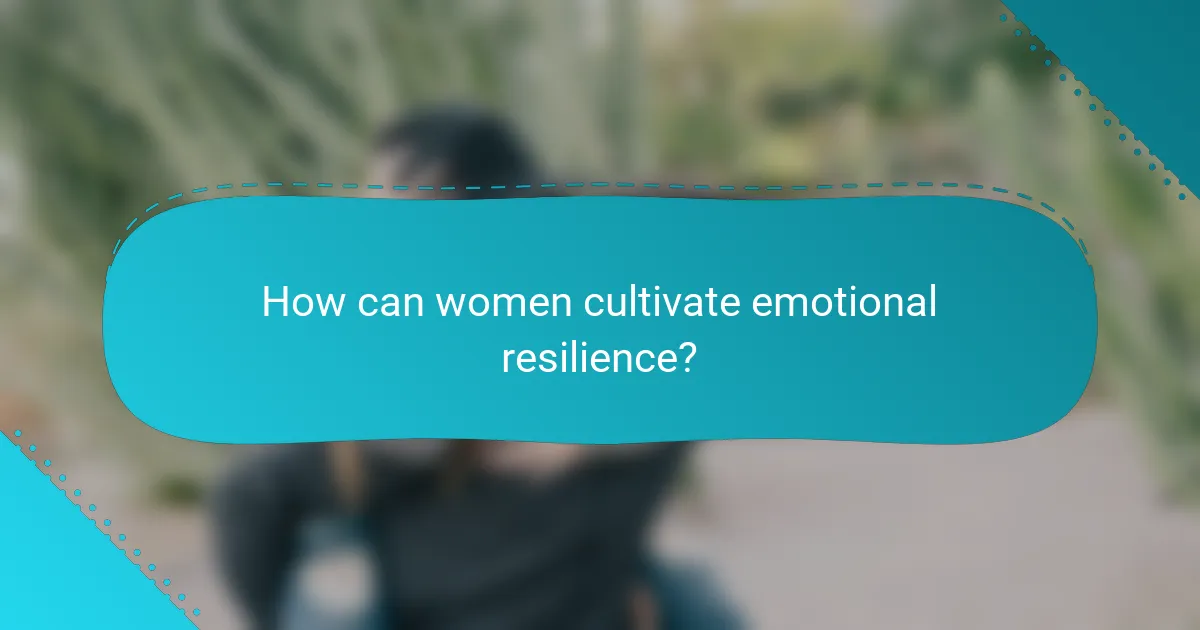
How can women cultivate emotional resilience?
Women can cultivate emotional resilience through self-care practices, social support, and cognitive strategies. Prioritizing mental well-being involves engaging in mindfulness, maintaining supportive relationships, and developing problem-solving skills.
Mindfulness techniques, such as meditation and deep breathing, enhance awareness and reduce stress. Engaging with friends and family provides emotional support, reinforcing a sense of belonging. Additionally, reframing negative thoughts fosters a positive mindset, which is crucial for resilience.
Regular physical activity is a unique attribute that significantly contributes to emotional health. Exercise releases endorphins, improving mood and reducing anxiety. Furthermore, seeking professional help when needed can provide tailored strategies for personal challenges.
Adopting these empowering strategies can lead to improved mental health outcomes for women, enabling them to navigate life’s challenges with greater strength and confidence.
What psychological tools are available for building resilience?
Psychological tools for building resilience include cognitive behavioral therapy, mindfulness practices, and emotional regulation techniques. These strategies enhance coping skills and promote mental well-being. Cognitive behavioral therapy focuses on changing negative thought patterns. Mindfulness practices encourage present-moment awareness, reducing stress. Emotional regulation techniques help manage feelings, fostering resilience.
How does positive self-talk influence mental health?
Positive self-talk significantly enhances women’s mental health by fostering emotional resilience and self-acceptance. It encourages a positive mindset, which can reduce anxiety and depression. Research indicates that women who engage in positive self-talk experience lower stress levels and improved coping strategies. Moreover, this practice can strengthen self-esteem, leading to better overall mental well-being. Regularly affirming positive thoughts creates a supportive internal dialogue, essential for emotional health.
What are the steps to practice gratitude daily?
To practice gratitude daily, incorporate these steps into your routine. Start by maintaining a gratitude journal to record three things you appreciate each day. Next, express gratitude to others through verbal acknowledgments or handwritten notes. Additionally, set aside time for reflection, focusing on positive experiences and their impact on your life. Lastly, engage in mindfulness practices to cultivate awareness of the present moment, enhancing your overall sense of gratitude.
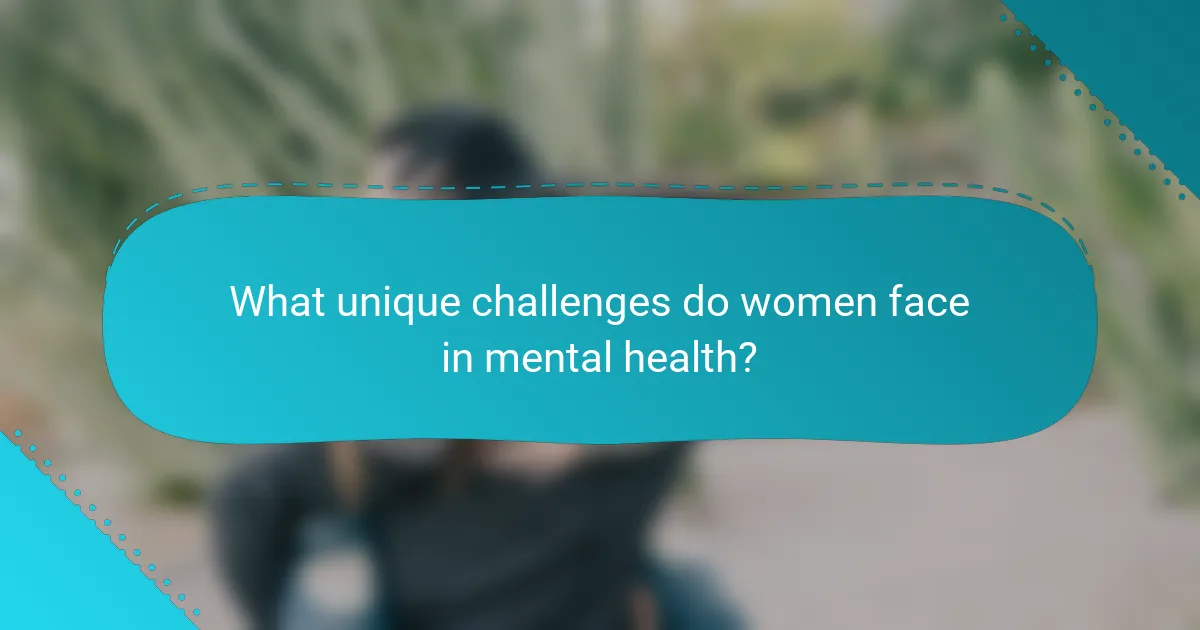
What unique challenges do women face in mental health?
Women face unique challenges in mental health due to societal expectations, stigma, and biological factors. These influences can lead to higher rates of anxiety and depression among women. Additionally, women often juggle multiple roles, such as caregivers and professionals, which can increase stress levels. The intersection of gender and mental health highlights the need for tailored support strategies. Empowering women through self-care practices and community support can enhance emotional resilience and overall well-being.
How do societal expectations affect women’s mental wellness?
Societal expectations significantly impact women’s mental wellness by creating pressure to conform to idealized roles. These pressures can lead to anxiety, depression, and low self-esteem. Research indicates that women often face conflicting demands, such as balancing career aspirations with traditional family roles, which can exacerbate stress levels. Empowering strategies, including self-care practices and supportive networks, can help women navigate these challenges and enhance emotional resilience. Addressing societal norms through education and advocacy is essential for improving women’s mental health outcomes.
What impact do caregiving responsibilities have on mental health?
Caregiving responsibilities significantly impact women’s mental health, often leading to increased stress and anxiety. Balancing caregiving with personal needs can create emotional strain, resulting in feelings of isolation and burnout. Research indicates that women who provide care are at a higher risk of developing mental health issues, including depression. Implementing self-care strategies, seeking support, and establishing boundaries can enhance emotional resilience and mitigate these effects.

What are common misconceptions about women’s mental health?
Many misconceptions exist regarding women’s mental health, often hindering effective support. One common myth is that mental health issues primarily affect women during reproductive events. In reality, mental health challenges can arise at any life stage. Another misconception is that women are more emotional and less rational, which undermines their experiences. Additionally, some believe that women are naturally predisposed to anxiety and depression, ignoring the impact of societal pressures and trauma. Education and awareness are essential to dismantle these myths and promote understanding.
How can stigma surrounding mental health be addressed?
Addressing stigma surrounding mental health requires education, open dialogue, and supportive communities. Initiatives that promote awareness can challenge misconceptions and foster acceptance. For instance, sharing personal stories can humanize mental health issues, encouraging empathy. Additionally, engaging in community programs can provide safe spaces for discussion and support, enhancing emotional resilience.
What myths about emotional resilience should be dispelled?
Many myths about emotional resilience in women’s mental health need dispelling. One common myth is that emotional resilience is an inherent trait rather than a skill that can be developed. Another misconception is that seeking help is a sign of weakness; in reality, it is a proactive step towards strength. Additionally, some believe that resilience means avoiding negative emotions, when it actually involves acknowledging and managing them effectively. Lastly, the notion that resilience is a one-time achievement overlooks the ongoing process of growth and adaptation in response to life’s challenges.
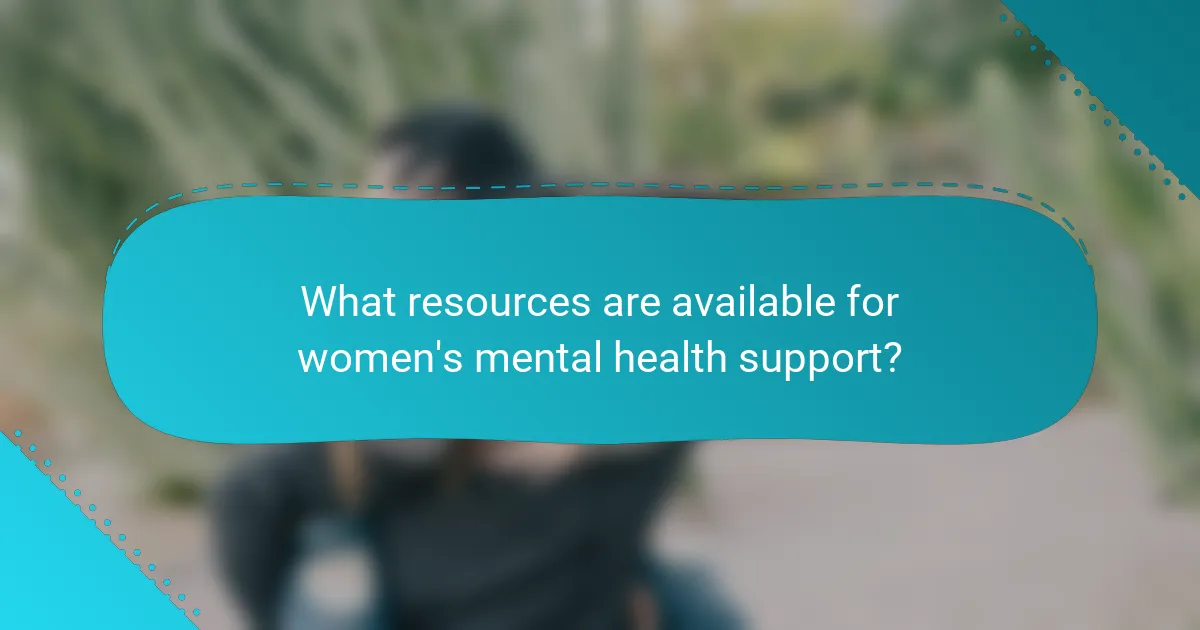
What resources are available for women’s mental health support?
Various resources are available for women’s mental health support, including therapy services, support groups, hotlines, and online platforms. Mental health apps can provide self-care strategies and coping tools. Community organizations often offer workshops focusing on emotional resilience. Additionally, educational materials promote awareness and understanding of women’s mental health issues. Access to these resources can enhance emotional well-being and provide necessary support.
How can therapy and counseling benefit women?
Therapy and counseling provide significant benefits for women’s mental health by promoting emotional resilience and self-care. These services help women process trauma, manage stress, and improve overall well-being.
Therapy enhances self-awareness, allowing women to identify and challenge negative thought patterns. As a result, this can lead to healthier coping strategies and improved relationships. Counseling offers a supportive environment where women can express emotions without judgment, fostering personal growth.
Research shows that women who engage in therapy experience reductions in anxiety and depression symptoms. Additionally, therapy can empower women to set boundaries and advocate for themselves, enhancing their sense of agency.
Support networks established through therapy can lead to lasting friendships and community ties, reinforcing emotional resilience. Overall, therapy and counseling are vital tools for nurturing women’s mental health.
What role do support groups play in recovery?
Support groups play a crucial role in recovery by providing emotional support, fostering connections, and sharing coping strategies. These groups create a safe space for women to express feelings and experiences related to mental health challenges. Participation in support groups can enhance emotional resilience, reduce feelings of isolation, and promote self-care practices. Research indicates that individuals engaged in support groups often report improved mental well-being and a greater sense of community.

What actionable tips can enhance women’s mental health?
To enhance women’s mental health, focus on actionable strategies like building emotional resilience, prioritizing self-care, and fostering supportive relationships. Implementing these strategies can significantly improve overall well-being.
1. Establish a daily self-care routine that includes physical activity, mindfulness practices, and adequate sleep.
2. Engage in social activities that promote connection and support, such as joining clubs or support groups.
3. Practice stress management techniques, including deep breathing exercises and journaling to process emotions.
4. Seek professional help when needed, such as therapy or counseling, to address mental health challenges.
5. Set realistic goals and celebrate small achievements to boost confidence and motivation.
How can women prioritize their mental health in daily life?
Women can prioritize their mental health daily by implementing structured self-care routines, seeking social support, and practicing mindfulness. Regular physical activity enhances mood and reduces stress. Establishing boundaries in personal and professional life fosters emotional well-being. Engaging in hobbies promotes joy and relaxation, while journaling helps process emotions. Consistent sleep patterns are crucial for mental clarity. Seeking professional help when needed ensures ongoing support and guidance.
What are the best practices for maintaining emotional well-being?
To maintain emotional well-being, women should prioritize self-care, build supportive relationships, and engage in mindfulness practices. Regular exercise and healthy eating also contribute significantly to emotional resilience. Establishing boundaries and seeking professional help when needed are essential strategies for long-term mental health.
What common mistakes should be avoided in self-care?
To enhance self-care, avoid common mistakes that undermine mental health. Prioritize consistency over sporadic efforts, as regular practices yield better emotional resilience. Neglecting personal boundaries can lead to burnout; learn to say no. Overlooking professional support limits growth; consider therapy when needed. Finally, dismissing self-compassion fosters negative self-talk; practice kindness towards yourself.
How can women create a sustainable self-care plan?
Women can create a sustainable self-care plan by prioritizing mental health, setting realistic goals, and incorporating enjoyable activities. Start by assessing emotional needs and identifying stressors. Schedule regular self-care activities, such as exercise, meditation, or hobbies. Track progress and adjust as necessary to maintain motivation and effectiveness. Engage with supportive communities or networks for shared experiences and encouragement. This approach fosters emotional resilience and enhances overall well-being.
